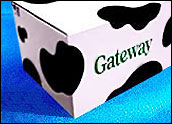
Pummeled by general economic woes and skidding demand for its handheldcomputers, Palm has announced a projected earnings shortfall, on the heels of the dismissal of nearly 20 percent of its staff. Adding insult to injury, as about 250 pink slips were being delivered Friday, financial house J.P. Morgan lowered Palm’s rating from “neutral” to “underweight.”
Palm remains the dominant force in the market for handheld computers, orPDAs, holding Microsoft’s Pocket PC at bay. But demand for mobile computing has started to wane, according to a report by the Yankee Group.
In February, Palm reduced prices on its Tungsten T model, a high-end deviceaimed at business users — but the pricing tactic could not compensate for thedemand shortfall. Demand for lower-priced units targeted toward entry-level and mid-range use remains on track to meet sales projections issued by the company in December, Palm said.
But the company suffers from more than just the economic ebb tide, Aberdeen Group senior analyst Isaac Ro told the E-Commerce Times. “Big vendors are jumping into the fray,” he said. “They know how to ship in volume. How does Palm survive in that environment?” Fortunately, he noted, Palm owns strong assets on the software side of its business.
Large Earnings Gap
As Palm nears its third-quarter reporting date of March 20th, the companyfaces a worst-case earnings scenario in which it might fall short of its December sales projections by 18 percent. In December, Palm forecast sales of between US$230 million and $250 million. The company’s revised estimate for the third fiscal quarter, which ended Friday, ranges between $205 million and $210 million.
Palm booked sales of $292 million in the year-ago third quarter, meaning the company could post a 29-percent year-over-year sales decline when it reports later this month.
IDC analyst Alex Slawsby cited the economic downturn as a primary factor for slumping PDA sales. “Enterprises are holding off on their purchases, with most users sticking with the products they have,” he told the E-Commerce Times. “It’s not a priority; most companies had to invest in updates of their laptop and desktop computers, which they had put off.”
Uneven Performance
That corporate reluctance may be one reason Palm has failed to establish sales momentum in its recent quarterly reports. The too-optimistic sales projection of December came after the company booked a profitable second quarter. But the two previous quartersregistered losses. Aberdeen’s Ro said the quarterly up-and-down “shows theextent to which Palm’s sales remain seasonally driven.”
Gross margins for the recently closed third quarter, estimated at about 30percent, are also down from previous quarters.
The company has not issued an estimate of its Q3 cents-per-share lossfigure. Analysts had been expecting a loss of 34 cents per share, but are now revising their estimates downward.
Additional Charges
Palm also announced its intention to build restructuring charges into its third-quarter balance sheet. Those expenses will amount to between $40million and $45 million, part of which will reflect Friday’s layoffs.
The company also announced a $100 million charge corresponding to thereduced value of its corporate real estate in San Jose, California.
As is usual in such uncomfortable circumstances, the company is waxingoptimistic about the future. In a published statement, Eric Benhamou, Palm’schief executive, expressed confidence in Palm’s overarching business plan while blaming the earnings shortfall on general economic uncertainty that affected both consumer and enterprise buying.
“We are fully confident in the magnitude of our long-term businessopportunity,” Benhamou said in a prepared statement.












































Social Media
See all Social Media